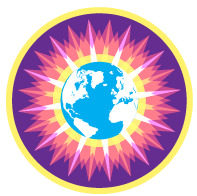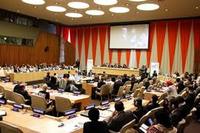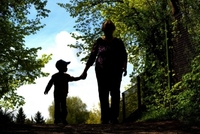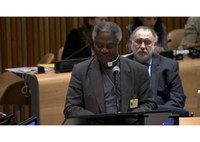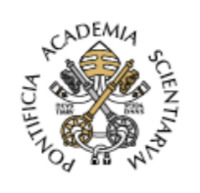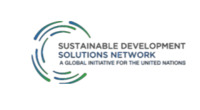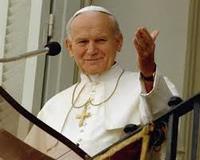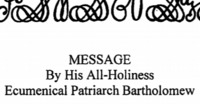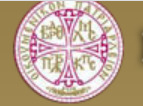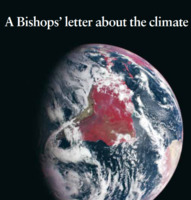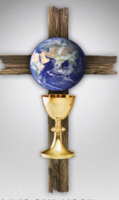Search
231 items
-
Green Corner Bulletin (St. Camillas Parish, Silver Spring, MD)
St. Camillas periodically issues their Green Corner Bulletin, in support of their stance on creation care as indicated on their website:
"Our preaching and liturgical music deepens our love of creation. Moreover, St. Camillus Church evangelizes by offering the adult faith formation programs on care of creation to parishioners, promoting various activities around Earth Day that spur people to adopt a more sustainable lifestyle, and doing advocacy for policy and legislation.
Our parish community is undertaking an effort to “green” our campus, reduce our energy consumption, and eliminate practices that are wasteful and destructive to God’s creation." -
Catholic Charities USA Prayer for Creation
Catholic Charities USA uploaded a prayer for creation on their website, focusing on cherishing the Earth rather than exploiting, and providing a reminder that we are all connected to each other and the land. This prayer for creation can be used in a variety of setting, especially in liturgical worship. -
Engaged Organizations: Global Catholic Climate Movement
Global Catholic Climate Movement discuss their identity and mission through the following excerpts from their website:
"Who we are
The Global Catholic Climate Movement is a first-of-its-kind international coalition of Catholics from many nations, continents, and walks of life. We are laity, religious, and clergy, theologians, scientists, and activists from Argentina, the Philippines, the United Kingdom, Kenya, Australia, the United States, and many other nations. We are united by our Catholic faith and our work in various roles and organizations on climate change issues."
"First, we recognize that conversations about the climate crisis have historically been more about intellectual arguments than about the profound spiritual and moral implications of our failure to care for God’s creation. Catholic leaders are thus called to speak with a prophetic voice and in a spiritual dialogue with all people, especially those political and business leaders and consumers who engage in climatically destructive policies and practices. And we recognize our own need for ongoing conversion to live more in keeping with the Creator’s intentions for life in abundance for all people. Until the moral implications of anthropogenic climate change are clearly established and accepted, it is unlikely that societies can or will transition in an appropriate timeframe to sustainable technologies, economies, and lifestyles." -
Engaged Organizations: Association of United States Catholic Priests
The Association of United States Catholic Priests discuss their climate change initiative on their website. The following excerpt list the first five "Green Commandments" from Fr. Joshtrom Isaac Kureethadamof's book on Laudato Si':
"Earth, our common home, is in peril. Take care of it.
Listen to the cry of the poor who are the disproportionate victims of the crisis of our common home.
Rediscover a theological vision of the natural world as good news/gospel.
Recognize that the abuse of creation is ecological sin.
Acknowledge the deeper human roots of the crisis of our common home." -
Islamic Declaration on Climate Change
In August of 2015, faith leaders, senior international development policy makers, academics and other experts announced an Islamic Declaration on Climate Change at an International Islamic Climate Change Symposium in Istanbul. The United Nations Framework Convention on Climate Change posted the following statement on their website:
"The leaders called on governments meeting in Paris to 'bring their discussions to an equitable and binding conclusion' bearing in mind:
The scientific consensus on climate change, which is to stabilize greenhouse gas concentration in the atmosphere at a level that would prevent dangerous anthropogenic interference with the climate systems; The need to set clear targets and monitoring systems; The dire consequences to planet earth if we do not do so; The enormous responsibility the COP shoulders on behalf of the rest of humanity, including leading the rest of us to a new way of relating to God’s Earth." -
A Statement of the Baha'i International Community to the UN Climate Change Conference in Paris, France
The Baha'i International Community provided a statement of shared vision regarding climate change at the United Nations Climate Change Conference in Paris, France. This statement from their website discusses the need for renewed individual consciousness, collective action, and redefining relationships to assist with sustainability. -
Declaration of the Health of People, Health of Planet and Our Responsibility Climate Change, Air Pollution and Health Workshop
The Pontifical Academy of Sciences posted findings and proposed solutions addressing problems of health of people and our planet, with a specific focus on climate change and air pollution, on their website. They present findings and proposed solutions that were presented at one of their workshop from November 2-4, 2017: -
Sikh Faith Statement on the Environment
This Sikh faith statement on the environment, based on the 1995 Windsor Statements, is posted on the Interfaith Center for Sustainable Development. Below is the introduction to the statement:
"The Sikh scripture, Guru Granth Sahib, declares that the purpose of human beings is to achieve a blissful state and to be in harmony with the earth and all creation. It seems, however, that humans have drifted away from that ideal. For the earth is today saturated with problems. It is agonizing over the fate of its inhabitants and their future! It is in peril as never before. Its lakes and rivers are being choked, killing its marine life. Its forests are being denuded. A smoky haze envelops the cities of the world. Human beings are exploiting human beings." -
Christian Ecology
Interfaith Center for Sustainability Development posted a Christian ecology statement, based on the 1995 Windsor Statements, on their website. The following is an excerpt discussing the challenges that have persisted over time with regard to the care for creation:
"In the words of the Orthodox Patriarchate, ‘This may well mean that just as a shepherd will in times of greatest hazard lay down his life for his flock, so human beings may need to forego part of their wants and needs in order that the survival of the natural world can be assured.'
The challenge to all Christians is to discover anew the truth that God’s love and liberation is for all creation, not just humanity, and to seek new ways of living that restore balance and hope of life to the endangered planet." -
Catholic Views on Climate Change - a statement from the Catholic Bishops of Australia
The Catholic Bishops of the Climate Institute, Australia created a statement on climate change. The statement emphasizes various responsibilities of individuals and entities that are necessary to provide a safe and healthy environment for all parts of the world. They also warn against further ecological destruction for future generations. -
Pope Benedict XVI on the Environment
The following website contains from quotes from Pope Benedict XVI from a book published in 2012 by Our Sunday Visitor called: The Environment by Pope Benedict XVI. Salient messages include the inter-connectedness of humans and the environment, a call to protect and care for the Earth, the need to alleviate environmental justice, and actions that can foster sustainability. -
Engaged Organizations: Center for Earth Ethics at Union Theological Seminary
The Center for Earth Ethics maintains a vision of world value that is based on the sustained well-being of humans and the planet. Their mission also includes policy change that supports their vision. Their four core programs that support this vision and mission are: Eco-Ministry, Environmental Justice and Civic Engagement, Original Caretakers, and Sustainability and Global Affairs. -
Presentation by Cardinal Peter K. A. Turkson of the Encyclical Laudato si’ in the ECOSOC Chamber
Cardinal Peter K. A. Turkson gave a presentation about Laudato si' at the United Nations Economic and Social Council (ECOSOC) Chamber on June 30, 2015. He emphasized that the environment, our common home, can not be considered in isolation, but rather is a product of integral ecology. Midway through the presentation, the question of the meaning of life is broached, asking the audience to ponder how the earth should be left for future generations. -
Remarks by Cardinal Peter K. A. Turkson on the Encyclical Laudato si’ to Child-Focused Agencies
Cardinal Peter K. A. Turkson addressed child-focused agencies at UNICEF House on June 30, 2015. His message is about the relevance of Laudato si' encyclical with regard to children and our common home. He urges individuals to contemplate the negative impact of climate change and how this will impact the future for our children. -
Statement by Cardinal Peter K. A. Turkson at the High Level Event on Climate Change
Cardinal Peter K. A. Turkson provides a statement on climate change at the United Nations High Level Event on Climate Change on June 29, 2015. He emphasizes that the plight of the poor and the fragility of the planet are intimately related. As stewards of the Earth, he therefore greatly urges individuals to make courageous choices in order to reverse the trend of global warming. -
Climate Change and the Common Good: A Statement of the Problem and the Demand for Transformative Solutions
The Pontifical Academy of Social Sciences prepared the following statement on climate change. It covers a wide range of associated sustainability issues. Various suggestions for societal interventions are also included within the statement. -
Declaration of Religious Leaders, Political Leaders, Business Leaders, Scientists and Development Practitioners
Business and political leaders, and scientists from around the world have congregated at the Pontifical Academies of Sciences and Social Sciences to address the climate change crisis. The introduction to the declaration is stated below:
"We the undersigned have assembled at the Pontifical Academies of Sciences and Social Sciences to address the challenges of human-induced climate change, extreme poverty, and social marginalization, including human trafficking, in the context of sustainable development. We join together from many faiths and walks of life, reflecting humanity’s shared yearning for peace, happiness, prosperity, justice, and environmental sustainability.
We have considered the overwhelming scientific evidence regarding human-induced climate change, the loss of biodiversity, and the vulnerabilities of the poor to economic,social, and environmental shocks." -
Address at the United Nations Climate Change Conference given by H.E. Archbishop James Patrick Green
H.E. Archbishop James Patrick Green provides a statement on the impact of climate change on poverty at the United Nations Conference in Lima, Peru on December 10, 2014. He discusses the interdependence of humans and the Earth. He emphasizes Pope Francis's call for intervention to fight against global warming in order to protect the planet and, in particular, those at the poverty level. -
Common Declaration on Environmental Ethics
On June 10, 2002, Pope John Paul II and Ecumenical Patriarch Bartholomew I issued a declaration on the environment. The introduction to the declaration is stated below:
"We are gathered here today in the spirit of peace for the good of all human beings and for the care of creation. At this moment in history, at the beginning of the third millennium, we are saddened to see the daily suffering of a great number of people from violence, starvation, poverty and disease. We are also concerned about the negative consequences for humanity and for all creation resulting from the degradation of some basic natural resources such as water, air and land, brought about by an economic and technological progress which does not recognize and take into account its limits." -
Global Climate Change A Plea for Dialogue Prudence and the Common Good
A Statement of the United States Conference of Catholic Bishops was issued on June 15, 2001. This document covers a multitude of current environmental problems and the resulting negative impact on populations around the world - especially with regard to indigent populations. It stressed the connectivity of human behavior and it's impact on the planet. -
Message by His All-Holiness Ecumenical Patriarch Bartholomew to the United Nations Conference of the Parties (COP 24) (Poland)
Ecumenical Patriarch Bartholomew I of Constantinople addressed the United Nations of the Parties (COP 24) in Poland, December 3-14, 2018. He emphasized the collective responsibility among all citizens to alleviate the climate problems. One key point includes the urgency to focus on lighter carbon footprints to preserve the Earth to assist in alleviating poverty and suffering.
-
Keynote Address by His All-Holiness Ecumenical Patriarch Bartholomew at the Arctic Circle Assembly
Ecumenical Patriarch Bartholomew I of Constantinople addressed the Arctic Circle Assembly in Reykjavik, October 13, 2017. Below is a section of the keynote address, focusing on the impact of climate change with regard to the Arctic Circle:
"Scientists tell us that the Arctic is a vibrant image and vivid mirror of the state of our planet as a whole. For scientists, the Arctic is the barometer of the globe's environmental health. The ecological misdeeds committed in other regions – including chemical contamination and nuclear radiation – are clearly evident in the Arctic environment. Above all, the dramatic rise in global temperatures is having a palpable effect on the Arctic landscape. Nevertheless, so many industrial societies and activities that cause climate change are often blind to the consequences of their behavior. But here, in the Arctic Circle, it is possible to see all manner of things so much more clearly. When we visit this pristine part of the planet, we cannot hide our eyes, either from the beauty of God’s creation or from the changes which human folly has generated. Nor can we avoid pondering the terrible consequences for the remainder – and the future – of the world, if glaciers continue to melt and sea-levels continue to rise." -
Common Declaration on Environmental Ethics
Pope John Paul II and the Ecumenical Patriarch His Holiness Bartholomew I delivered a speech titled Common Declaration on Environmental Ethics on June 10, 2002. Below is the introduction within the declaration, focusing on the current state of the poor and the consequences of natural degradation:
"We are gathered here today in the spirit of peace for the good of all human beings and for the care of creation. At this moment in history, at the beginning of the third millennium, we are saddened to see the daily suffering of a great number of people from violence, starvation, poverty and disease. We are also concerned about the negative consequences for humanity and for all creation resulting from the degradation of some basic natural resources such as water, air and land, brought about by an economic and technological progress which does not recognize and take into account its limits." -
A Bishops’ Letter about the Climate
Below is a section of the introduction from A Bishops’ Letter about the Climate, which covers a multitude of critical environmental issues, from the 2014 Bishops' conference:
"We have lived with reports and forecasts of climate change since the 1980s. Our climate is the result of the interaction of complex systems and there is often a great distance between cause and effect in terms of both space and time. There are uncertainties and a lack of clarity. However, the knowledge we possess today does not allow us to postpone until tomorrow
what needs to be done now. Our human climate impact must decrease for the sake of the earth, for the sake of the world that God so loves that God gave us Jesus Christ." -
The world is our host: A call to urgent action for climate justice
Anglican Bishops from around the world discuss various environmental complications resulting from climate change. They provide a list of initiatives of commitment that they have pledged as a church, some of which include strengthening collaboration among partners, developing and distributing educational resources and liturgical materials, and strengthening of ethical investment guidelines. They also list actions that individuals can take to support their mission.












